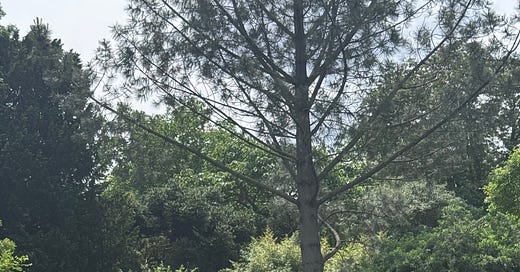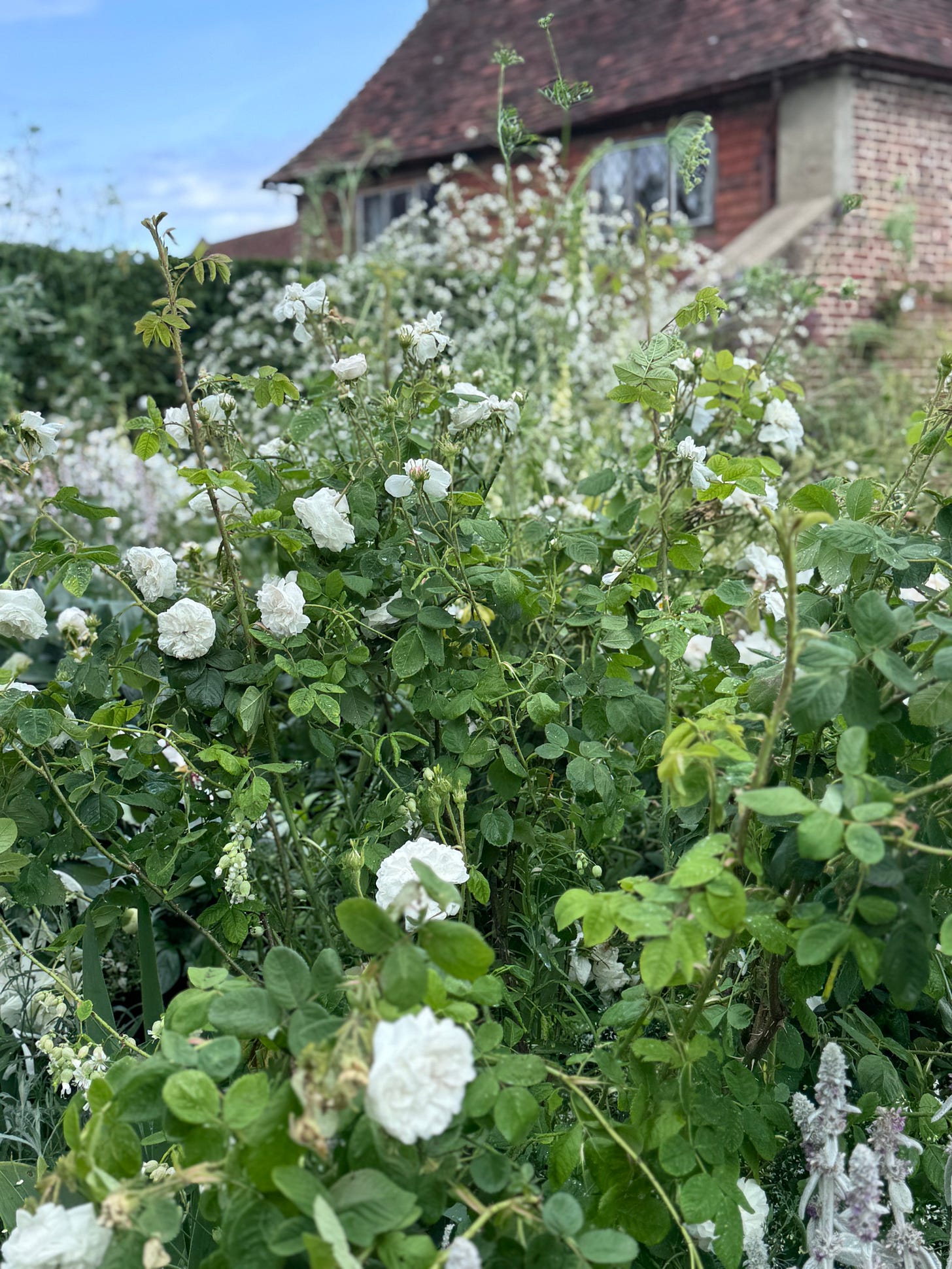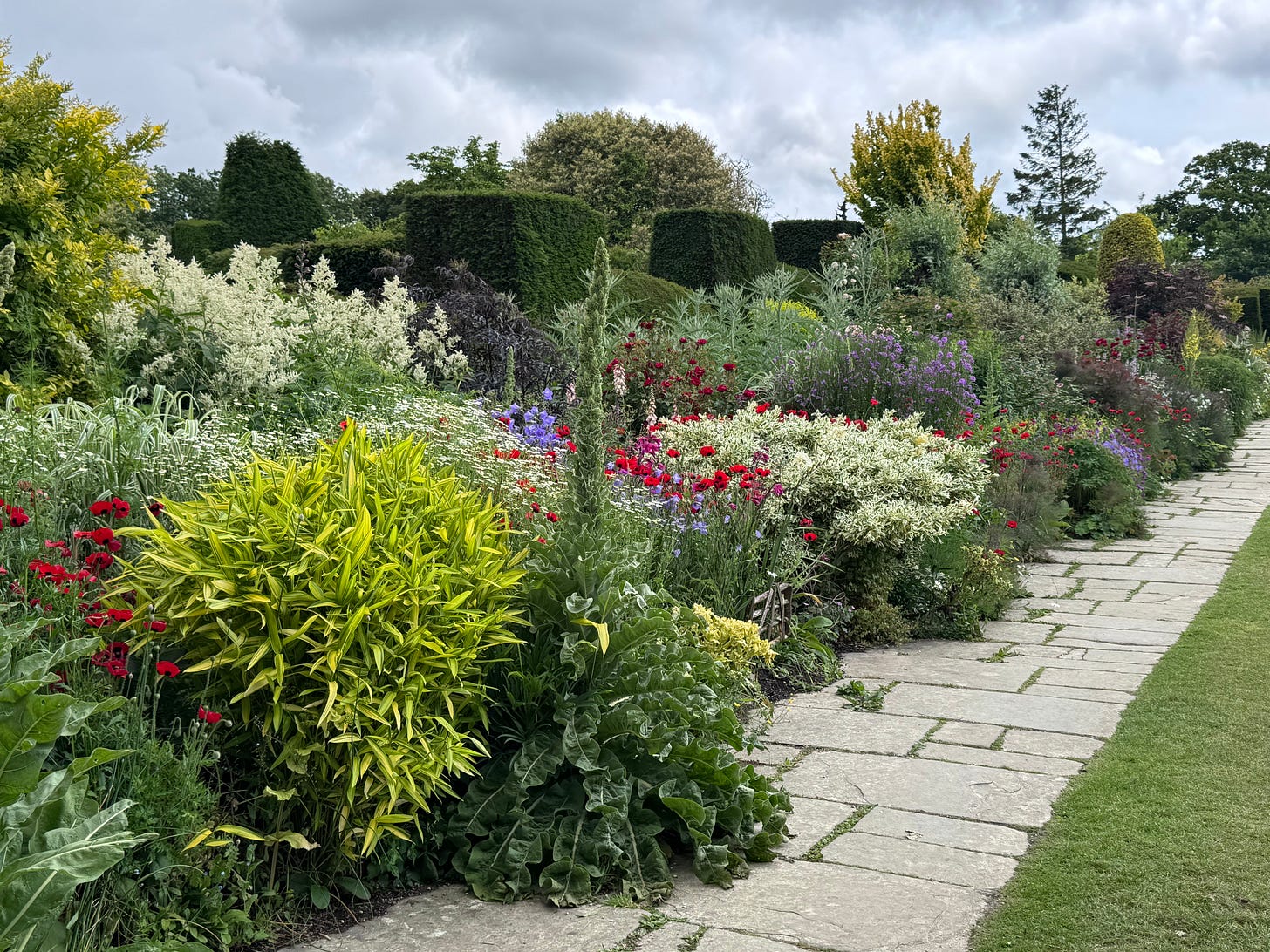I wrote most of this piece last Sunday afternoon, while riding the high speed train from London to Bristol where one of my oldest friends lives with her husband.
Pam was my sleepaway camp counselor and group leader from 1974 into the early eighties, when I was a counselor myself. We’ve often talked about this — the fact that she didn’t quite know what to make of me as a dour child just in double digits; I was a grump, a scowler with an attitude problem, perpetually angry and irritated and probably irritating, like a walking splinter. She never knew what was going on in my home life outside of camp; none of my counselors but one (who is also now a dear friend) did. But here we are, fifty-one years since our first summer together, I’m in my early sixties and she is in her seventies, we’re both long-married to the loves of our lives (her lovely husband was also a counselor at camp), and staring into a time of life when the hours take on the strange habit of coiling back on themselves, and the time we spend moving forward is acutely connected to the time that has already gone by. The past informs the present informs the future; I am who I am now because of who I was then, whether I like it or not.
The irony is, of course, that neither of us likely ever thought we’d be friends as adults, but here we are. This is a gift. Another irony: the root of my trouble back then is keenly at the root of my trouble now. My mother showed up at every camp visiting day with my father, dressed to the nines, and I distinctly recall her flirting heavily with a tall, tan, handsome English counselor called Eddie, who flirted right back, both of them ignoring the fact that my father was standing right there, watching. When I close my eyes, I can see her in her beige, lace-front hip-huggers with their snakeskin placket, her false eyelashes, her blue-lensed aviators. The camp owners used to gently suggest that visitors not wear heels of any kind on visiting day, but my mother didn’t give a shit, and made up her own rules; she towered over everyone including me, wearing her kork-ease wedge sandals and a thin blouse tied in a knot above her waist. Another friend of mine — also a former counselor who knew my parents from 1972-1978 — once told me that I was the only child there who cried when my parents arrived for visiting day.
Sometimes I walk along centuries-old paths in devastatingly beautiful gardens borne of someone else’s need for a secure foundation, for a sure foothold.
When Susan and I left the States to come to England at the end of last month, my primary concern was the inevitability of trouble at home — that my mother, irate at my having the temerity to leave for this trip, would orchestrate some sort of problem designed to either keep us at home, or require our turning around to go back upon arrival. Failing at the former — she tried everything: dental problems, apartment problems, etc — she has spent every daily check-in call growling at me in blazing fury. It’s the voice I recognize so well; I lived with it daily as a child, an adolescent, and a young adult, and I never knew when I woke every morning whether that was what would greet me. The deep-voiced, monosyllabic anger meant to cajole me into asking her what was wrong, pleading with her to know why was she upset, and what had I done. My body responds the same way now as it did then: my stomach turns over, I shiver, my mouth goes dry. Only now, I recognize it well; at the risk of sounding maudlin, my heart breaks for the younger daughter I once was, who only ever wanted to please her, to make her happy, to not be the cause of her rage. I never knew back then that the cause in fact wasn’t me at all; I was just a convenient repository for her disappointment and impropriety, and for many years I couldn’t fight back. And then, I could, and did, and the game changed.
So, on this trip, when she begins to drop her voice an octave and speaks to me in a vengeful and poisonous rasp, I determine whether or not she’s safe, that she has food and is taking her pills, and then I hang up. I want to say to her You will not believe what I’ve seen; I can’t wait to show you—but I can’t, because it’s all a setup. Sometimes I weep and sometimes I don’t; sometimes I walk along centuries-old paths in devastatingly beautiful gardens borne of someone else’s need for a secure foundation, for a sure foothold. I admire the gardens’ boundaries and the attempted imposition of order on the sheer wildness of nature, and the way tightly packed beauty can succeed in crowding out weeds. I am freakishly obsessed with this idea, and wonder if this is why I’m so drawn to gardening to begin with: the suggestion that the uncontrolled and the tamed could possibly exist in the same place at the same time, and the relentless belief—the hope—that the former could be held back when really, it can’t. My mother’s behavior can only ever be marginally harnessed before it creeps back over my boundaries and borders to emerge like bindweed, strangling everything in its path despite its lovely and fragrant white flowers that fool me into sweet complacency. You turn your back on your garden for a just a few days — you hope for the best — and suddenly, it is dead.
My mother’s behavior can only ever be marginally harnessed before it creeps back over my boundaries and borders to emerge like bindweed, strangling everything in its path despite its lovely and fragrant white flowers that fool me into sweet complacency.
Over the last week, Susan and I have spent hours in two of the world’s most spectacular gardens: Sissinghurst Castle, former home of Vita Sackville-West and Harold Nicolson, and Great Dixter, built by the Lloyd family, its gardens created by Christopher Lloyd and now managed by Fergus Garrett. I have long been in love with the writing of Vita Sackville-West, who was besotted by beauty and passion in all their forms, in a manner that can only be described as profoundly human. It’s been a dream of mine to visit Sissinghurst, and when we arrived a few days ago, the last thing I ever could have imagined was that we would be shown the gardens and Vita’s private spaces by her granddaughter, Juliet, whose wonderful book, A House Full of Daughters, was a primary source for my third book, Motherland. I will write more extensively about Sissinghurst in the coming days; it’s almost impossible to accurately describe its sensory explosion of fragrance, texture, and color. It felt somehow wrong to be there, as though the gardens were such a deeply private labor of love, which they were and are. Vita died in early June of 1962, just as her garden was coming into its most robust beauty, and I like to think that one of the last things she saw was the result of what she had poured her heart and spirit into. I could feel her there, walking its paths and opening the door to her writing space, and welcoming us in as women who understand the challenges of marching to a different beat not understood by everyone, but finding safety and sustenance in beauty and affection of our own devising.
It’s been a strange juxtaposition: the vital need to be amidst such beauty as a counterweight against my mother’s fury, and the world’s. Because I’m not at home, her rage is coming out in other, more wily ways: the threat of firing one of her aides (which she has no legal ability to do), the overspending on a credit card meant for emergencies. This is who she is; it is her nature, her biological makeup. Like an overgrown bed of weeds and vines that might choke out anything that flourishes, the borders and boundaries we put in place are only temporarily successful, until they’re not.
An ongoing battle.
I am now in Edinburgh as I write this; this is the place of Susan’s ancestors, and so stunning that I find myself standing on street corners, looking up, and gasping like a fool. The ancient here is indeed ancient, and it is everywhere. From here, we are traveling to a small rural cottage not far from Perth, where I hope to unplug for a few days, and from there, to Cambridge. I’m still phoning my mother every day to make sure she is safe — that her needs are being met, that she has food and help to get around — and, for now, she is. We intend to make the four mile walk from Cambridge to Grantchester, which I last did in 1983 when I had just turned twenty, and then, we’ll spend some time in Clare College gardens because: borders and boundaries and the beauty and wildness they contain.
Note: I am writing this on an iPad outfitted with a keyboard, and hyperlinks are mostly impossible. I will add them on my return. Thanks for your patience.
*Penelope Lively, Life in the Garden








Oh, Elissa. My heart aches for you. I'm sorry you have to deal with being attacked by your mother on your vacation. And, endlessly at home as well, even as you do your best to care for her. I know what it is to love someone who is so frequently poison and I can feel in my own heart your heroic efforts to understand her and claim some goodness and sanity and peace in the face of what she has always been and done.
I think the work you do internally, and the gift we are afforded when you share that work with us, is greater than you will likely ever fully know. Thank you.
That the abuse in your childhood and the long work to recognize it has led you to deep compassion--something that is everywhere in this bounteous essay--is the stuff of awe. I'm so glad you made it on this trip and I wish you, step by garden step, peace and grounding.